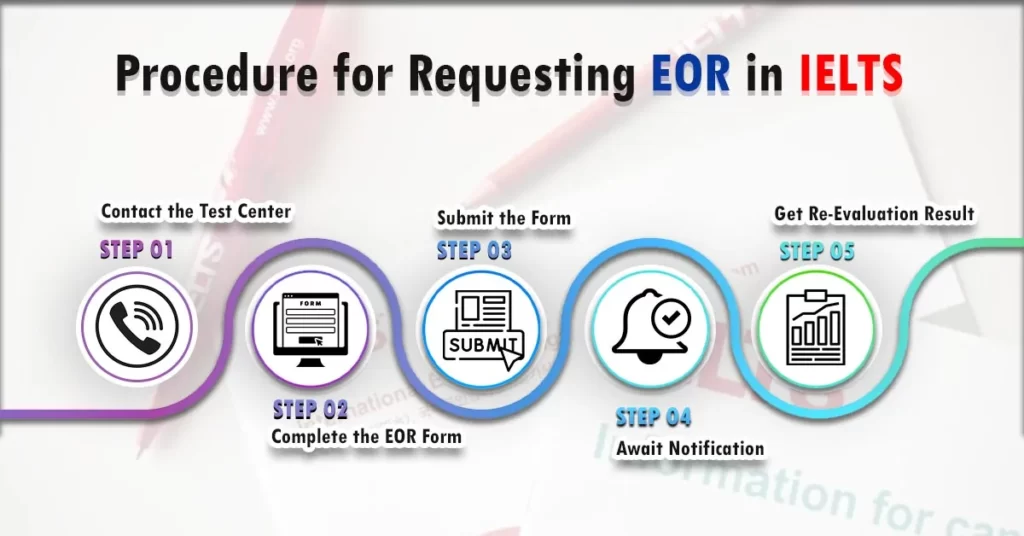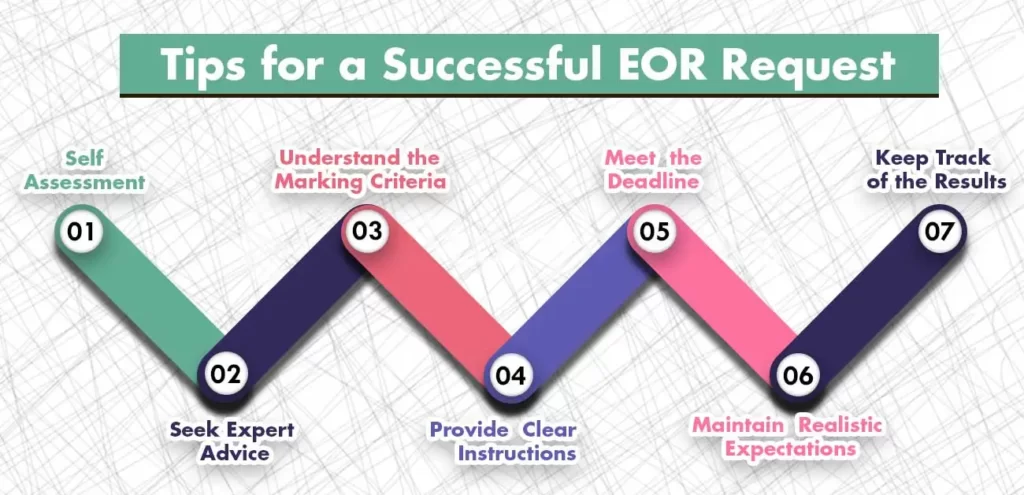
In the journey towards achieving your desired score in the International English Language Testing System (IELTS), you may come across a term called Enquiry on Results (EOR). If you’ve ever wondered about EOR’s meaning in IELTS and how it can potentially impact your test results, you’re in the right place. This blog post will provide you with a comprehensive understanding of what is EOR in IELTS, eligibility requirements, procedure, costs, and tips for a successful request.
What Is EOR in IELTS and Its Purpose?
The Enquiry on Results (EOR) is a service provided by the IELTS authorities that allows test-takers to request a remarking of their test scores if they believe their performance does not reflect their true abilities. It offers a mechanism for candidates to seek a fair and accurate evaluation of their language proficiency, providing an opportunity to potentially increase their scores and achieve their desired results.
What Are the Benefits of EOR in IELTS?
The International English Language Testing System (IELTS) is widely recognized as a reputable examination for assessing language proficiency. In fact, in 2022, there was a 15% spike in students appearing for the test in India. However, even with rigorous evaluation procedures in place, there may be instances where test-takers feel their performance does not accurately reflect their true abilities. This is where the Enquiry on Results (EOR) in IELTS plays a crucial role. Here are some major benefits of requesting EOR in IELTS:
- Ensuring Fair Evaluation: It allows candidates to request a remarking of their test papers if they believe their performance has been unjustly assessed. By applying for an EOR, test-takers can seek a thorough re-evaluation of their answers by experienced examiners to ensure a fair and accurate representation of their language proficiency.
- Gaining Confidence and Validating Abilities: Obtaining a desirable score on the IELTS test is often a key requirement for various purposes, such as admission to universities, professional registration, or immigration applications. The EOR process allows individuals to challenge their initial scores and potentially achieve the desired outcome, boosting their confidence and validating their language proficiency.
- Addressing Potential Errors or Anomalies: Human judgment is not infallible, and there may be instances where errors or anomalies occur during the marking process. By requesting an EOR, individuals can ensure that their test papers are thoroughly reviewed, allowing for the identification and rectification of any potential mistakes that may have influenced the initial scoring.
- Maximizing Opportunities: For individuals with specific score requirements for academic or professional pursuits, the EOR process can be instrumental in opening doors to new opportunities. A slight increase in scores can sometimes significantly affect meeting eligibility criteria for scholarships, university admissions, or employment prospects.
Understanding IELTS Scoring System
Do you know that the average IELTS score is 6.8 (for a female) and 6.2 (for a male) in 2022? After taking the IELTS test, one eagerly awaits the IELTS score, which is calculated on a 9-band scale. Each band score reflects the level of English proficiency of the test taker. The IELTS score is rounded up or down to the nearest 0.5, resulting in scores such as (4.0, 5.0, 6.0, 7.0) or (4.5, 5.5, 6.5, 7.5) in each part.
The mean score of all four parts of the exam is considered to determine the overall IELTS band score. Let’s understand the calculation process through the following example:
Section Band Score
Listening 6.5
Reading 6.5
Writing 5.0
Speaking 7.0
By calculating the average of the four parts, we get a score of 6.25. However, according to IELTS scoring rules, this score is rounded off to the nearest 0.5, resulting in an overall band score of 6.5.
Explore More:
- Is 6.5 a good score in IELTS Exam?
- IELTS Eligibility Criteria
- Ultimate Guide to the Up-to-Date IELTS Syllabus
- Is 7.5 a Good IELTS Score?
Is It Good to Apply for EOR in IELTS?
If you have taken the IELTS test and are unsatisfied with your results, you may wonder if it is worth applying for an Enquiry on Results (EOR). The decision to pursue an EOR should be based on careful consideration of various factors.
When to Consider Applying for an EOR in IELTs
Applying for an EOR can be a suitable option in the following scenarios:
Substantial Discrepancy: If you believe that your performance in a specific IELTS test section does not align with your expectations and that an error may have occurred during the marking process, then applying for an EOR is worth considering.
Required Score for Specific Purpose: If you need to achieve a certain score for admission to a university, professional registration, or immigration purposes, and you are confident that your abilities were not accurately reflected in your original results, pursuing an EOR may be a prudent choice.
Benefits of Applying for an EOR
Potential Score Increase: The primary benefit of applying for an EOR is the possibility of a score increase. Remarkably, some test-takers have experienced an improvement in their scores after a re-marking. This can significantly impact your overall outcome, providing opportunities that were previously out of reach.
Satisfaction and Peace of Mind: Applying for an EOR allows you to address any doubts or concerns about the accuracy of your original results. By seeking a re-mark, you can gain reassurance and confidence in the fairness of the evaluation process.
Considerations Before Applying for an EOR
Realistic Expectations: While an EOR request can lead to a score increase, it is important to approach the process with realistic expectations. The outcome of an EOR request may vary, and there is no guarantee of a score change. Therefore, it is crucial to be prepared for the possibility of the original score being maintained or even decreased.
Time and Cost Factors: Applying for an EOR involves additional time and cost. You should carefully consider whether investing in the re-marking process aligns with your priorities and resources. It is essential to weigh the potential benefits against the associated expenses and the potential impact on your study or immigration plans.
Procedure for Requesting EOR in IELTS
The EOR process allows you to seek a remarking of your test by following the designated procedure. Here’s a comprehensive guide on how to initiate an EOR request.

Offline Mode:
- Contact the Test Center: Contact the test center where you took the IELTS exam and express your interest in requesting an EOR. The center will provide you with an IELTS EOR form that includes the necessary details and cost information, which may vary depending on the center.
- Complete the EOR Form: Carefully fill in all the required information on the EOR form, ensuring accuracy and completeness. Provide the necessary details, such as your personal information, test date, and the specific sections for which you request a remark.
- Submit the Form: Return the completed EOR form to the test center administration. They will forward it to either Australia or the UK for the re-evaluation process.
- Await Notification: Once the re-evaluation is complete, you will receive an email from the test center at the email address provided. This email will contain the updated scorecard, indicating any changes in your scores, and details regarding the refund fees.
- No Change in Scores: If there are no changes in your scores after the re-evaluation, the original scorecard will be returned to you, and the fees will not be refunded.
Online Mode:
- Access the Test Taker Portal: Log in to the Test Taker Portal using your credentials.
- Navigate to EOR Option: Within the portal, locate and click on the “Enquiry on Results (EOR)” option to initiate the process.
- Follow the Guidelines: Follow the guidelines provided within the portal to ensure a smooth and hassle-free EOR request. The portal will guide you through the necessary steps and provide instructions on submitting the request.
Alternate Method:
You can fill out a form and send it to ielts@britishcouncil.org.br to request an Enquiry on Results for your IELTS English exam.
What is the Fee of EOR in IELTS?
The cost of EOR varies depending on the type of IELTS test you have taken. The following table provides an overview of the EOR fees for different types of IELTS tests with their administrative charges (inclusive of all taxes):
IELTS Test Type EOR Fee (INR)
IELTS INR 12,200
CD IELTS INR 12,200
UKVI IELTS INR 12,375
LIFE SKILLS INR 11,525
While the EOR service incurs a fee, it is essential to weigh its value against the potential benefits it offers. Applying for an EOR can allow you to seek a fair and accurate evaluation of your language proficiency. If you genuinely believe that your performance does not reflect your true abilities, the EOR process may be a worthwhile investment.
Tips for a Successful EOR Request
To ensure a successful Enquiry on Results (EOR) request, here are some valuable tips that can help you in submitting a successful EOR request:

- Self-Assessment: Begin by thoroughly assessing your performance in the specific sections you wish to be re-marked. Carefully review your answers, compare them to the scoring criteria, and identify any potential discrepancies or errors that may have affected your scores.
- Seek Expert Advice: Consult with our experienced IELTS trainer, who is well-versed in the EOR process. She can provide valuable insights, assess your performance objectively, and guide you on whether an EOR request is warranted based on their expertise.
- Understand the Marking Criteria: This will help you better understand the aspects the examiners consider while evaluating your responses. By gaining a deeper understanding of the criteria, you can make a stronger case for a re-marking request if you believe your original scores do not reflect your abilities.
- Provide Clear Instructions: When completing the EOR application form, clearly indicate the sections you wish to be re-marked. In the remarks section of the form, provide any relevant information or reasons for your request.
- Meet the Deadline: Pay close attention to the deadline for submitting your EOR request. To avoid any delays or complications, submit your application well in advance, allowing ample time for processing.
- Maintain Realistic Expectations: While an EOR request offers the possibility of score improvement, it is important to maintain realistic expectations. There is no guarantee that your scores will be changed, as the re-marking process involves a thorough reassessment by experienced examiners.
- Keep Track of the Results: Stay in touch with the relevant authorities or your test center to inquire about the status of your request.
Conclusion: What is EOR in IELTS in 2024?
The Enquiry on Results (EOR) service allows test-takers to request a re-marking of their IELTS scores if they believe their performance does not reflect their true abilities. It is a valuable option for those who genuinely believe that an error may have occurred during the marking process. However, it is crucial to approach the EOR process strategically and weigh the potential benefits against the associated costs.
FAQs:
What is EOR in IELTS simple language?
EOR stands for Enquiry on Results. It is a process of having your IELTS test papers re-marked by a different examiner. The EOR process is not guaranteed to improve your score. In fact, the chances of your score increasing are only about 50%. However, if you are confident that you did better than your original score, then it may be worth applying for an EOR.
What should I consider before requesting an enquiry of results (EOR)?
Before requesting an Enquiry on Results (EOR), there are a few factors to consider:
- Keep in mind that the success rate of EOR is about 50%. So, be confident about incorrect marking before proceeding.
- You’ll have to pay a fee with EOR, so assessing whether the potential benefit outweighs the cost for you is important.
- Remember that EOR requests must be made within six weeks of your test date.
So, adhere to the timeline. Taking these factors into account will help you make an informed decision regarding an EOR request.
How to request a remark of your IELTS test?
To request a remark on your IELTS test, you have two options: you can either contact your test center directly or submit a request online. When making the request, you will need to provide your test date, test center information, and your IELTS ID number. It’s important to ensure that you have this information ready before proceeding. Additionally, a fee associated with the remark request varies depending on the test provider and location by following the appropriate channels and providing the necessary details. You can initiate the process of remarking your IELTS test.
Will I get more marks in revaluation?
While it is possible to receive more marks in an EOR, there is no guarantee of an increase in scores. The success rate of EOR requests is approximately 50%. It means that only half of the people who request a remark see an improvement in their scores.
What is the success rate of EOR?
The success rate of Enquiry on Results (EOR) requests in 2023 is approximately 50%. This means that, on average, about half of the individuals who request a remark experience an increase in their scores. While the other half do not see any changes. It’s important to keep this success rate in mind when deciding whether to proceed with an EOR request.
When should you take EOR?
Enquiry on Results (EOR) should be pursued only when you strongly believe your test was incorrectly marked. It is crucial to be confident in your belief that you deserve a higher score before initiating the EOR process. If you have any doubts or uncertainties, it may not be worth the cost and effort of requesting a remark. Carefully assess your performance, compare it to the scoring criteria, and consult with experts if necessary.
Is IELTS revaluation worth it?
Whether or not IELTS revaluation is worth it depends on a number of factors, including:
- Your original scores: If you are only a few points away from your target score, then an EOR may be a worthwhile investment. However, if you are already far from your target score, then it is unlikely that an EOR will make a significant difference.
- Your confidence in your performance: If you are confident that you answered the questions correctly and that your writing and speaking were of a high standard, then an EOR may be a good option. However, if you are not confident in your performance, then it is probably not worth the risk.
- The cost of the EOR: The cost of an EOR is not insignificant. You will need to pay a fee for each module that you want to have re-marked. If you are on a tight budget, then you may want to consider re-taking the IELTS instead of applying for an EOR.
The success rate of IELTS revaluation is about 50%. This means that there is a 50% chance that your score will be increased, and a 50% chance that it will stay the same or even decrease. If you are considering applying for an EOR, you should weigh the costs and benefits carefully.
What is the fee for rechecking IELTS results?
The fee for rechecking an IELTS result varies depending on the test provider and location. In India, the fee for rechecking various IELTS results are:
- LIFE SKILLS – 11,525
- CD IELTS -12,200
- UKVI IELTS – 12,375
- LIFE SKILLS – 11,525
It’s important to note that this fee is subject to change. It’s advisable to check with the specific test provider or visit their official website for the most accurate and up-to-date information on the fee structure.
Can I retake IELTS writing only?
No, it is not possible to retake only the IELTS writing component. The IELTS test consists of four sections: Listening, Reading, Writing, and Speaking. These sections assess your overall English language proficiency. If you wish to retake the IELTS test, you will need to retake all four sections.


